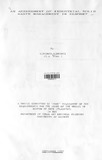| dc.description.abstract | Industrial pollution has become a common phenomenon in the developed countries and is now a major problem in the developing countries. Industrialization in Kenya is not an exception but has only increased in the recent past. This has been accompanied by a high degree of industrial pollution Industrial pollution has become a common phenomenon in the developed countries, and is now a major problem in the developing countries. Industrialization in Kenya is not an exception but has only increased in the recent past. This has been accompanied by a high degree of industrial pollution.
Industries usually extract raw materials from nature and release byproducts
like gases, liquids and solid wastes into the environment. We are therefore faced with the problems of determining the appropriate methods of managing these wastes in order to conserve the environment. Proper solid waste management is one of the methods of contributing to this goal.
This study set out to study the way industrial wastes are managed with the aim of providing planning, institutional and organizational solutions to the problems of managing industrial wastes and by extension industrial pollution.
The study took a case study of Eldoret, one of Kenya’s fastest growing towns in terms of industries, among other aspects. The study examined the factors leading to rapid industrial development in the town, the types of industries, the types of wastes these industries generate, estimated their amounts, how they are collected, handled, transported and finally disposal.
It was found out that the rapid development of industries without due
consideration to the proper management of wastes In Kenya is directly related to the level of pollution and environmental degradation. it was also found out that poor coordination between the local authorities and industrialists led to unmonitored pollution in the town.
The town of Eldoret has a substantial number of industries, most of them agro-hased with a growing number of chemical and engineering Industries. The wastes these industries produce are enormous, with various compositions and levels of toxicities given this diverse nature of the industries.
it was also found out that there were no records kept of these wastes, thus making planning difficult. From the fieldwork, an industry in Eldoret produce on average 1.645 tonnes of solid wastes per day, giving a total of about 50.51 tonnes from the whole of the industrial area. Most of the industrialists in Eldoret collect their wastes in their compounds, which also happens to he the disposal site, thus eliminating the need for transport.
They also dispose their wastes by uncontrolled burning, causing a lot of air pollution on top of other dangers like fire risks. It was thus considered that proper management of industrial solid wastes called for a more concerted effort by the central government, through the ministries of commerce and industry and environment and natural resources, the local authority and the industrialists themselves. It was further considered that a complete change in policy and laws at the national and local levels were urgently needed in order to be realistic in the protection of the environment. | |

